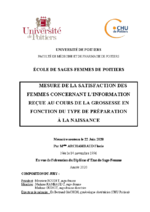Mémoire
Archambaud Florie
Mesure de la satisfaction des femmes concernant l'information reçue au cours de la grossesse en fonction du type de préparation à la naissance
FrançaisConsulter le texte intégral (format PDF)

Résumé
Français
Mesure de la satisfaction des femmes concernant l'information reçue au cours de la grossesse en fonction du type de préparation à la naissance
Introduction et objectifs : Pour répondre au besoin d’informations des futurs parents, la Préparation à la Naissance et la Parentalité (PNP) a été instaurée pour renforcer l’information délivrée à l’occasion des consultations prénatales. Notre objectif principal était d’évaluer la satisfaction des femmes concernant l’information reçue au cours de la grossesse en fonction du type de préparation à la naissance ainsi que pour l’accouchement. Nos objectifs secondaires étaient d’évaluer le nombre de thématiques abordées et leur fréquence en fonction du type de PNP reçu ainsi que les thématiques pour lesquelles les femmes manquaient d’informations.
Méthodologie : L’étude était rétrospective et monocentrique au CHU de Poitiers et s’est déroulée durant une période de 4 mois. L’échantillon était de 66 femmes. Un questionnaire était distribué dans le service de suites de couches à chaque femme correspondant aux critères d’inclusion. Les questions étaient adaptées en fonction de la catégorie à laquelle les femmes appartenaient (aucun apport d’informations supplémentaires, EPP seul, séances de PNP seules, EPP + PNP). L’échelle de Likert a permis aux femmes de noter leur satisfaction concernant l’information globale reçue, l’accouchement et les différentes thématiques pouvant être
abordées au cours de leur grossesse.
Résultats : Il n’existait pas de différence concernant la satisfaction à propos de l’information globale reçue ainsi que de l’accouchement en fonction du type de préparation à la naissance suivi. Le sujet concernant le tabac, l’alcool et les drogues était plus abordé pour les femmes ayant bénéficié d’un EPP. Les femmes ayant bénéficié d’un EPP étaient plus satisfaites pour les sujets concernant l’activité physique au cours de la grossesse et la place du conjoint. Il n’y avait pas de différence entre le nombre de thématiques abordées et le type de préparation à la naissance suivi. Les femmes étaient les moins satisfaites de l’information donnée pour les sujets concernant le prolapsus, la sécheresse vaginale, l’apparition de vergetures et la sexualité au cours de la grossesse, quel que soit le type de préparation à la naissance.
Conclusion : La PNP dans sa globalité améliore la satisfaction des femmes concernant l’information reçue. L’EPP maintenant obligatoire est à promouvoir ainsi que sa mise en place.
Mots-clés libres : information, satisfaction, grossesse, préparation à la naissance et à la parentalité, entretien prénatal précoce, accouchement.
- Entretien prénatal précoce
- Période périnatale
- Grossesse
- Accouchement
English
Introduction and objectives : To meet the need of information for the future parents, the childbirth and parenthood education was set up in order to reinforce the information given for the antenatal consultations. Our main goal was to assess the women’s satisfaction regarding the information received during the pregnancy according to the type of preparation for the pregnancy and childbirth. Our secondary goals were to evaluate the number of topics addressed and their frequency related to the childhood and parenthood education, as well as the topics women were lacking information for.
Methods : The study was retrospective and monocentric at the University Hospital of Poitiers and has been carried out for four months. The sample consisted of 66 women. A survey was shared within the department of postpartum period to each woman matching the inclusion criteria. The study was adjusted depending on the category the women were part of (no additional information provided, only Early Prenatal Interview (EPI) , only Childbirth and parenthood education sessions, and EPI combined with Childbirth and parenthood education). The scale of Likert enabled women to rate their satisfaction score depending on the overall information received, the childbirth and the different topics that might be addressed during their pregnancy.
Results : There was no difference concerning the satisfaction of the overall information received and the childbirth regarding the type of birth preparation received. The topic of tobacco, alcohol and drugs was the most discussed with the women who had received an EPI. Women who had received an EPI shared an higher satisfaction for the topics related to physical exercice during the pregnancy and husband’s support. There was no difference between the number of topics addressed and the type of childbirth preparation. Women were the least satisfied with the information given on the pelvic organ prolapse, vaginal droughts, the emergence of striae gavidarum and the sexuality during the pregnancy, regardless of the type of childhood preparation.
Conclusion : The overall childbirth and parenthood education tends to improve the satisfaction of the women regarding the information received. The EPI, now mandatory, must be promoted as well as its implementation.
Notice
- Diplôme :
- Diplôme état sage femme 5ème année
- Établissement de soutenance :
- Université de Poitiers
- UFR, institut ou école :
- UFR Médecine et Pharmacie
- Domaine de recherche :
- Maïeutique
- Directeur(s) du travail :
- Bertrand Gachon
- Date de soutenance :
- 22 juin 2020
- Président du jury :
- Thomas Bouin
- Membres du jury :
- Bertrand Gachon, Cindy Rambaud, Sylvie Guinot-Bujon
Menu :
-
-
à propos d'UPétille
-
Voir aussi
Annexe :

-
Une question ?
Avec le service Ubib.fr, posez votre question par chat à un bibliothécaire dans la fenêtre ci-dessous ou par messagerie électronique 7j/7 - 24h/24h, une réponse vous sera adressée sous 48h.
Accédez au formulaire...
Université de Poitiers - 15, rue de l'Hôtel Dieu - 86034 POITIERS Cedex - France - Tél : (33) (0)5 49 45 30 00 - Fax : (33) (0)5 49 45 30 50
petille@support.univ-poitiers.fr -
Crédits et mentions légales
